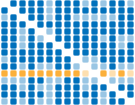W Rzymie na Campo di Fiori
Kosze oliwek i cytryn,
Bruk opryskany winem
I odłamkami kwiatów.
Różowe owoce morza
Sypią na stoły przekupnie,
Naręcza ciemnych winogron
Padają na puch brzoskwini.
Tu na tym właśnie placu
Spalono Giordana Bruna,
Kat płomień stosu zażegnął
W kole ciekawej gawiedzi.
A ledwo płomień przygasnął,
Znów pełne były tawerny,
Kosze oliwek i cytryn
Nieśli przekupnie na głowach.
Wspomniałem Campo di Fiori
W Warszawie przy karuzeli,
W pogodny wieczór wiosenny,
Przy dźwiękach skocznej muzyki,
Salwy za murem getta
Głuszyła skoczna melodia
I wzlatywały pary
Wysoko w pogodne niebo.
Czasem wiatr z domów płonących
Przynosił czarne latawce,
Łapali płatki w powietrzu
Jadący na karuzeli.
Rozwiewał suknie dziewczynom
Ten wiatr od domów płonących,
Śmiały się tłumy wesołe
W czas pięknej warszawskiej niedzieli.
Morał ktoś może wyczyta,
Że lud warszawski czy rzymski
Handluje, bawi się, kocha
Mijając męczeńskie stosy.
Inny ktoś morał wyczyta
O rzeczy ludzkich mijaniu,
O zapomnieniu, co rośnie,
Nim jeszcze płomień przygasnął.
Ja jednak wtedy myślałem
O samotności ginących.
O tym, że kiedy Giordano
Wstępował na rusztowanie,
Nie znalazł w ludzkim języku
Ani jednego wyrazu,
Aby nim ludzkość pożegnać,
Tę ludzkość, która zostaje.
Już biegli wychylać wino,
Sprzedawać białe rozgwiazdy,
Kosze oliwek i cytryn
Nieśli w wesołym gwarze.
I był już od nich odległy,
Jakby minęły wieki,
A oni chwilę czekali
Na jego odlot w pożarze.
I ci ginący, samotni,
Już zapomniani od świata,
Język ich stał się nam obcy
Jak język dawnej planety.
Aż wszystko będzie legendą
I wtedy po wielu latach
Na nowym Campo di Fiori
Bunt wznieci słowo poety.
Warszawa, 1943



.jpg)
